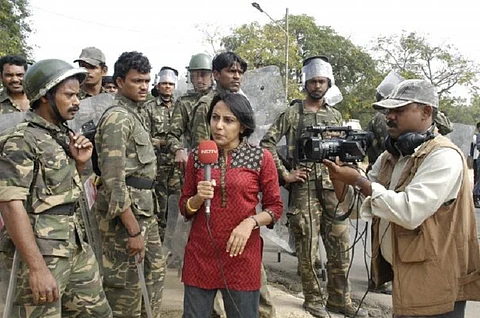

With a journalism career spanning nearly 28 years – 20 of them in television – she has covered some of the biggest news stories in south India, and in particular the states of Andhra Pradesh and Telangana. For her impressive body of work, covering issues like politics, children and women, human rights and rural distress, Uma Sudhir, the Executive Editor (South) at NDTV has been awarded the Chameli Devi Jain Award for an Outstanding Woman Journalist for the year 2017 by The Media Foundation.
“Her incisive and analytical reports help create awareness of ground realities in the states. The jurors were impressed with the amount of work put into her stories through travelling, talking to people and examining underlying issues, and then conveying the stories with a humane touch,” stated a press release from The Media Foundation, which has been recognising women journalists with The Chameli Devi Jain Award for the past 38 years.
Born in Thiruvananthapuram, Uma spent her childhood years in Hyderabad and Bombay, before completing her schooling and undergraduation in New Delhi. Uma’s gateway into journalism was the Times School, where she enrolled herself in a one-year programme in 1989. Soon after, she began her journalism career with Times of India in New Delhi, starting off at the desk. When Sushmita Sen won the Miss Universe contest in 1994, Uma was Features Editor, responsible for the cover spread on the first Indian woman to win the crown. After marrying fellow journalist TS Sudhir, Uma moved from Delhi to the city of Hyderabad, where she spent her primary school years.
Speaking to TNM, Uma says, “I moved to Hyderabad as Sudhir was at the time setting up the NDTV office in Hyderabad. Having spent around five years in Hyderabad as a child, I had learnt basic Telugu. Life has a way of connecting dots, and this basic knowledge of Telugu came in handy when I moved to Hyderabad as the state correspondent for Times of India.”
Days after their shift in August 1995, Uma plunged headlong into Telugu politics when a young Chandrababu Naidu staged a coup against his father-in-law and then Chief Minister NT Rama Rao.
In 1998, Uma moved to television when the then Star News was redefining India’s broadcast space, when it became the first 24x7 news channel. “NDTV’s brand of journalism ensured that it was not just politics that I covered. My reportage included news that very often did not make the front pages of the newspaper, including development news. We were, as a result, able to set the agenda and give space to this,” notes the 49-year-old journalist.
Pointing out that although as a television reporter she did not have the luxury to specialise in one field, she tried to keep the focus on issues that mattered – whether it was farmer suicides or covering stories on child trafficking and female infanticide, to carrying out a sting operation on an international adoption racket.
“I covered stories in the hinterland, but I tried to make it relevant for an urban audience,” she says, adding that her experience has allowed her to look at public policy and how that has had an impact on lives.
And while journalism – especially television – is physically and mentally taxing, Uma says her motivations are rather simple. “I had done a story on fluorosis in Nalgonda and even won a UN award for it. I went back 20 years later and found that there was no change and I wondered ‘What am I doing?’ But I have also realised that so many individual lives have changed for the better as well. There was an 8-year-old girl who weighed 8 kg in Mahbubnagar. People came forward to help her, pay for her surgery after her story was broadcast. When you see small stories making a change, or a difference, it makes you feel good,” recounts Uma, who adds that the power of the camera is a blessing.
And with a job that comes with odd timings, an unpredictable itinerary that packs you off to far-off locales, raising a 14-year-old daughter has not been easy. “Children adapt to how you bring them up. But that said, the traditional Indian family set up has been a big blessing. My in-laws are there to look after my daughter and my parents also live nearby and offered support,” says Uma.
Looking back, Uma says she has no regrets not moving back to Delhi. “Sudhir and I both wanted to get a few years of state experience before returning to Delhi, because Delhi is considered the place for journalism – to be in the reckoning for things. But I have no regrets as there is a flipside to everything. You get subsumed in Delhi, whereas being away, you get more opportunities to explore other journalism, you get to do more ground reportage,” she explains.
And what words of advice does she have for budding journalists? “A little bit of madness, passion and addiction to news is required. You can’t do journalism otherwise. It’s an everyday thing – something keeps happening and you need to keep up and keep abreast of things,” Uma says.